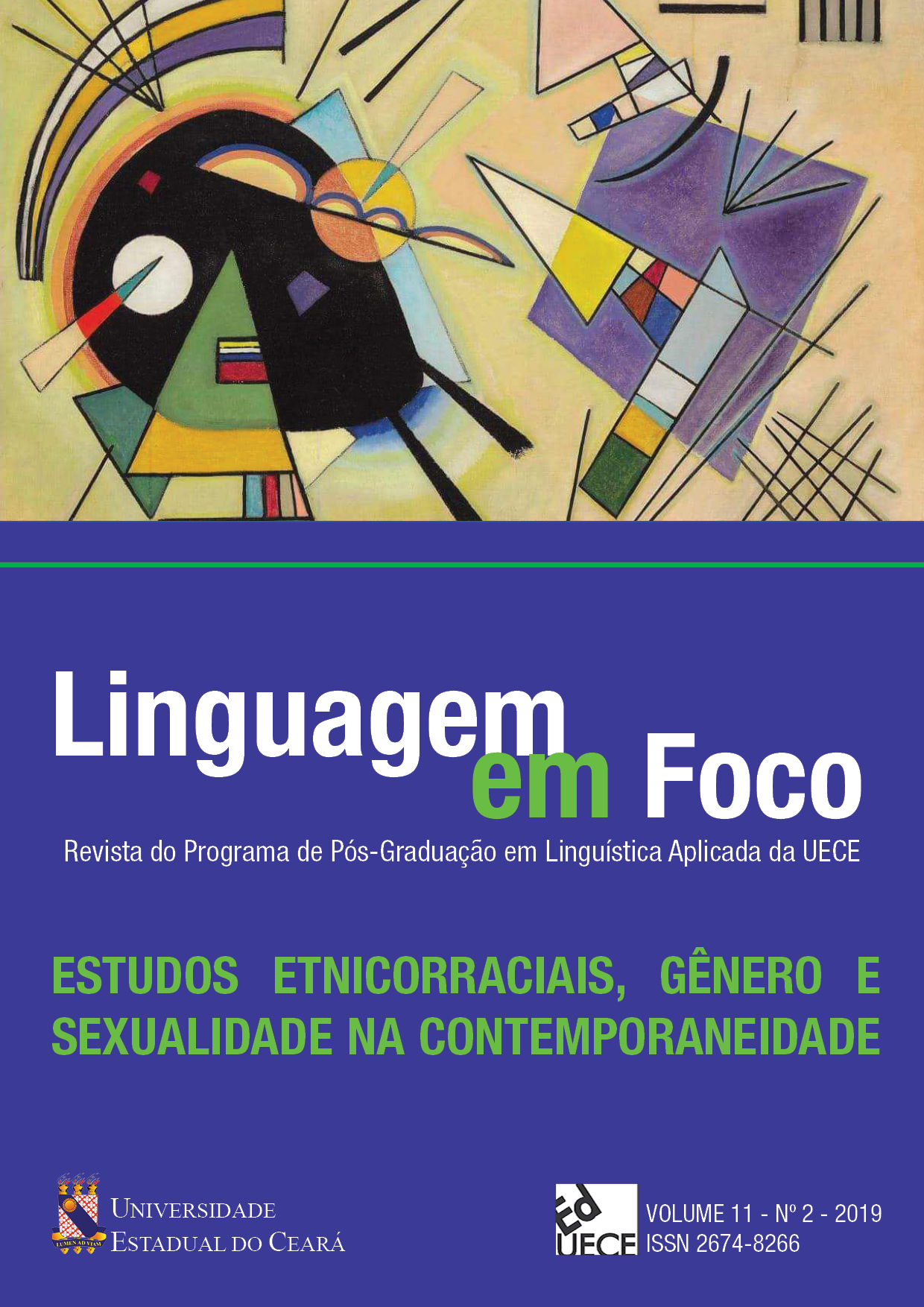“We Are Not Feminists. We Just Want to Be Recognized as Fisherwoman”
Intersectionalities and Narrative Performances of Black Fisherwoman in Arraial do Cabo
DOI:
https://doi.org/10.46230/2674-8266-11-2918Keywords:
Intersectionality, Narrative Performances, Fisherwomen, Arraial do CaboAbstract
Having as a benchmark the performative view of language (AUSTIN, [1962] 1990; DERRIDA, 1972) of gender and racial performances (BUTLER, 1990; 1993; BUCHOLTZ, 2011), this paper is a study of narratives (SANTOS, 2007; FERREIRA , 2016) which aims to discuss the relevance of gender and race D/discursive performances for a better understanding of the fishing culture in Arraial do Cabo (FERREIRA, 2016) and to analyze the indexicality orders (BLOMMAERT, 2010) suggested in these performances, from an intersectional analysis of the data (CRENSHAW, 2002; AKOTIRENE, 2018; LOVE, 2019). The results point to indexicality orders with less competitive relationships and greater interdependence (HOOKS, 2018) between fishermen and fisherwomen.
Downloads
References
AUSTIN, J. L. How to do things with words. Oxford: Oxford University Press. 1962.
BUCHOLTZ, M. White kids. Language, race, styles and youth identity. USA: Cambridge University Press, 2011.
BUTLER, J. Problemas de gênero. Feminismo e subversão da identidade. Rio de Janeiro: Civilização Brasileira, 1990/2003.
______. Bodies that matter. On the discursive limits of sex. London: Routledge, 1993.
______. Excitable Speech. A politics of performative. New York & London: Routledge, 1997.
BLOMMAERT, J. Sociolinguistic scales. Working Papers in Urban Language and Literacies. Paper 37. King´s College London, p. 1-15, 2006.
______. A messy new market place. In: ______. The sociolingusitics of globalization. Cambridge: Cambridge University Press, 2010. p. 28-62.
COLLINS, P. Aprendendo com a outsider within: a significação sociológica do pensamento feminista negro. Revista Sociedade e Estado, v. 31, n. 1, jan./abr. 2016.
COLLINS, P. BILGE, S. Intersectionality. Cambridge: Cambridge University Press, 2016.
CRENSHAW, K. Documento para o encontro de especialistas em aspectos da discriminação racial relativos ao gênero. Estudos Feministas, ano 10, p. 171-188, 2002.
DERRIDA, J. Signature Event Context. In.: ______. Limited Inc. Evanston, Northwestern: University Press, 1977. p. 1-23.
FERREIRA, M. A. G. Entre redes de discursos e de pesca: performances narrativas de mulheres pescadoras em Arraial do Cabo. 2016. 199 p. Tese (Doutorado) – Universidade Federal do Rio de Janeiro, Rio de Janeiro, 2016.
______. “Eles num vê uma mulhé na água / (...) eles vê como se fosse um homem”: cronótopos e performances de gênero na pesca em Arraial do Cabo. Caderno Espaço Feminino, Uberlândia, MG, v. 30, n. 1, p. 279-303, jan./jun. 2017.
FERREIRA, M. A. G. e FIALHO, R. M. Nas redes de saberes e histórias. Rio de Janeiro: União Nacional de Autores, 2013.
GARCEZ, P. M. Transcrição como teoria: a identificação dos falantes como atividade analítica plena. In.: MOITA LOPES, L. P, BASTOS, L. C. (Orgs.). Recortes multi e interdisciplinares. Campinas: Mercado de Letras, 2002. p. 83-95.
GEE, J. P. An introduction to discourse analysis: Theory and Method. London; New York: Routledge, 1999.
GUBRIUM, J. F.; HOLSTEIN, J. A. Postmodern Interviewing. SAGE Publications: [s.n.], 2003.
HOOKS, B. O feminismo é para todo mundo: Políticas arrebatadoras. Rio de Janeiro: Rosa
dos Tempos, 2018.
LINSKER, R.; TASSARA, H. O mar é uma outra terra. São Paulo: Terra Virgem, 2005.
LOVE, B. L. We want to do more than survive: abolitionist teaching and the pursuit of educational freedom. Boston: Beacon Press, 2019.
LORDE, A. Idade, raça, classe e gênero: mulheres redefinindo a diferença. Tradução de Léa Viveiros de Castro. In.: ______. Sister Outsider: Essays and speeches. Nova York: Crossing Press, 1984.
MISHLER, E. G. Research Interviewing: Context and Narrative. Harvard University Press. USA, 1986.
PRADO, S. M. Da anchova ao salário minímo: uma etnografia sobre injunções de mudança social em Arraial do Cabo. Niterói: EdUFF, 2002.
RAMOS, L. Crise política e as esquerdas. In.: BUENO, Winnie et. al. Tem saída? Ensaios críticos sobre o Brasil. Porto Alegre: Zouk, 2017.
SANTOS, W. S. O longo caminho até Damasco: rede de mudança e fluxo de mudança em Narrativas de Conversão religiosa. 2007. 210 p. Tese (Doutorado) – Pontifícia Universidade Católica, Rio de Janeiro, 2007.
SCHNACK, C. M.; PISONI, T. D.; OSTERMAN, A. C. Transcrição da fala: do evento real à representação da escrita. Revista Entrelinhas, ano II, n. 2, maio/ago. 2005. Disponível em: <http://www.entrelinhas.unisinos.br/index.php?e=2&s=9&a=12>. Acesso em: 10 set. 2019.
SCOTT, J. W. Gender: A Useful Category of Historical Analysis. The American Historical Review, v. 91, n. 5, p. 1053-1075, Dec. 1986.
WORTHAM, S. Narratives in action: A strategy for research and analysis. [S.l.]: Teachers College; Columbia University, 2001.
Downloads
Published
How to Cite
Issue
Section
License
Copyright (c) 2020 Maria Aparecida Gomes Ferreira

This work is licensed under a Creative Commons Attribution 4.0 International License.
Authors who publish in Linguagem em Foco Scientific Journal agree to the following terms:
- Authors retain the copyright and grant the journal the right of first publication. The articles are simultaneously licensed under the Creative Commons Attribution License which allows sharing the work with an acknowledgement of its authorship and initial publication in this journal.
- The concepts issued in signed articles are the absolute and exclusive responsibility of their authors. Therefore, we request a Statement of Copyright, which must be submitted with the manuscript as a Supplementary Document.
- Authors are authorized to make the version of the text published in Linguagem em Foco Scientific Journal available in institutional repositories or other academic work distribution platforms (ex. ResearchGate, Academia.edu).





























